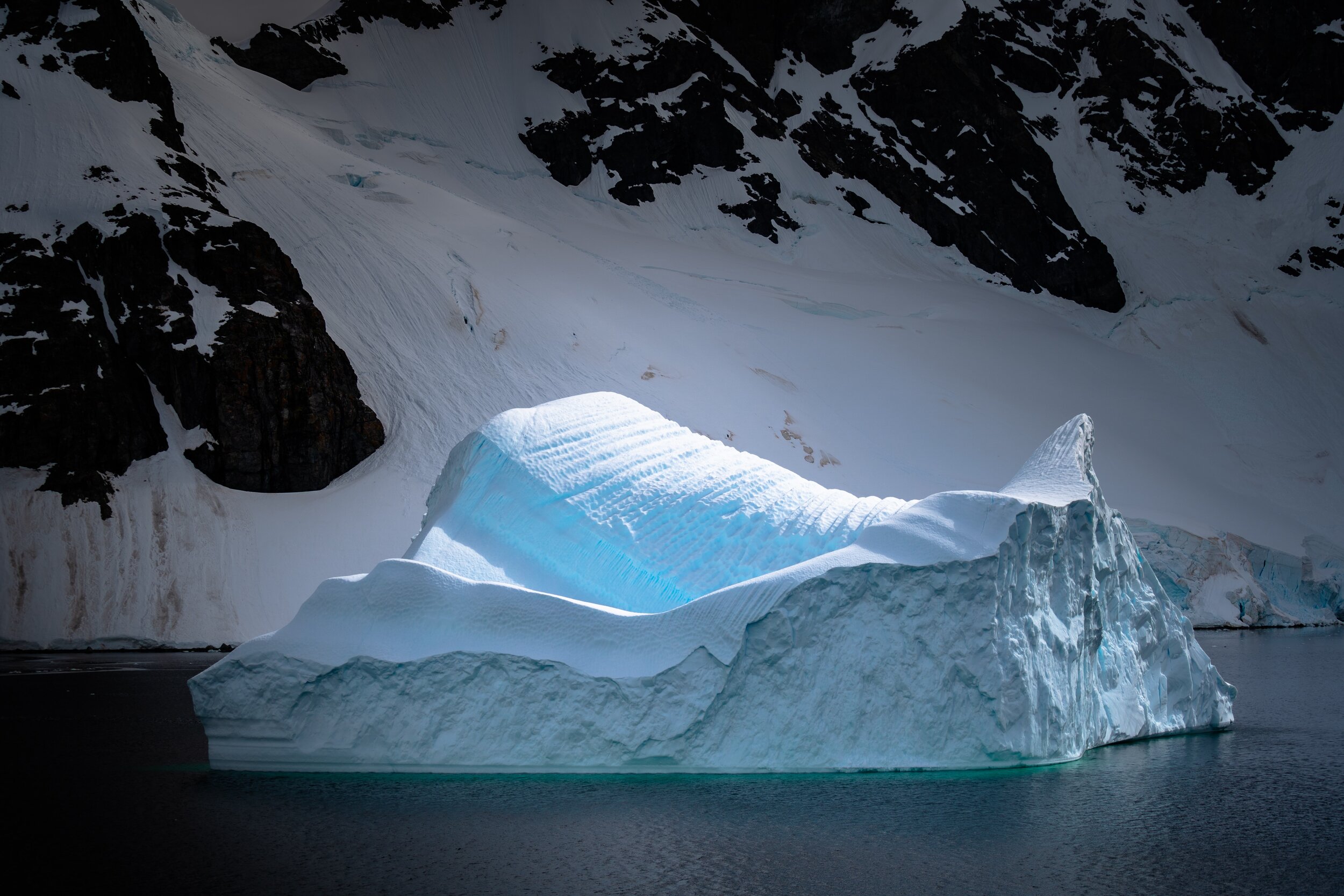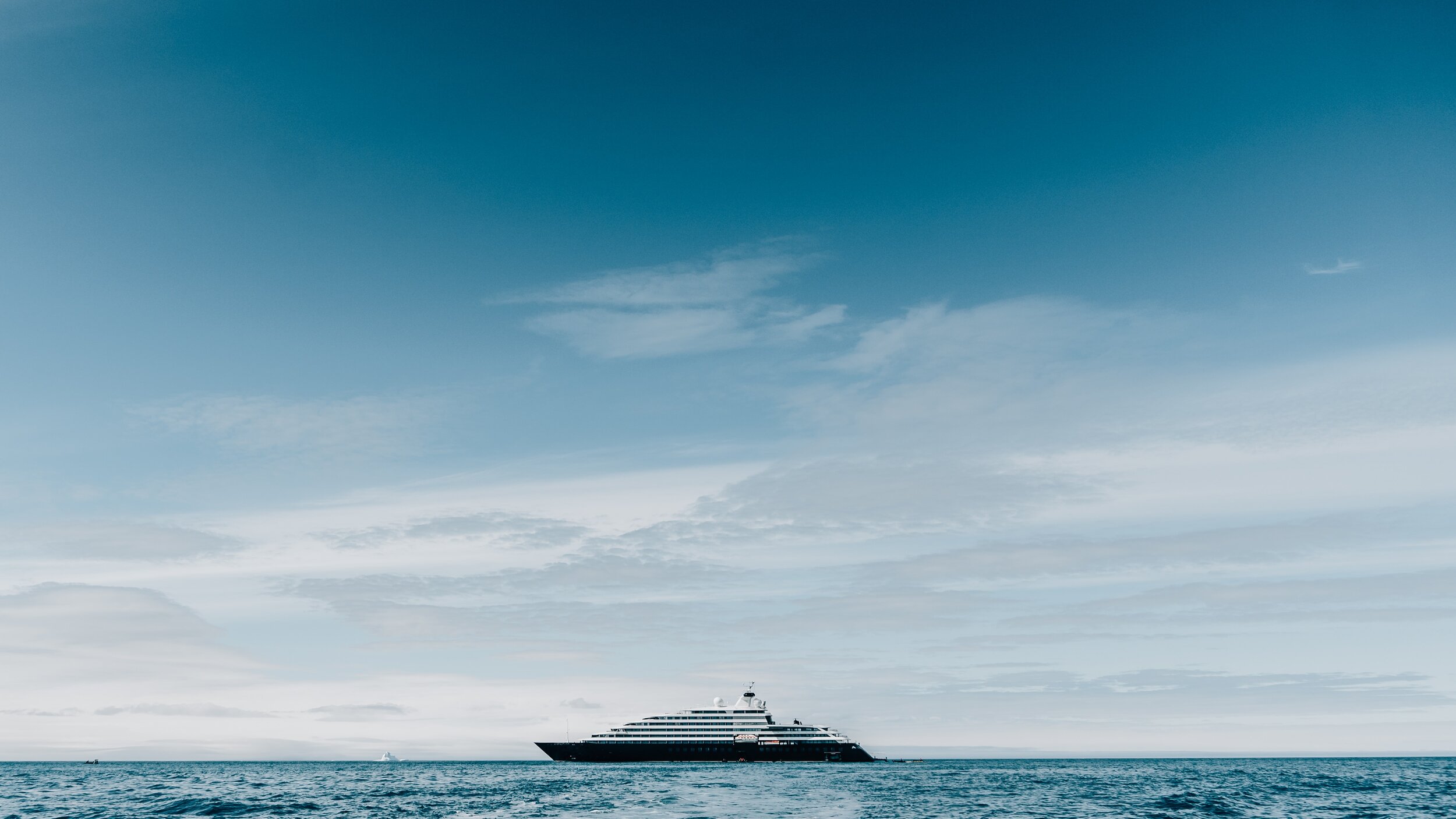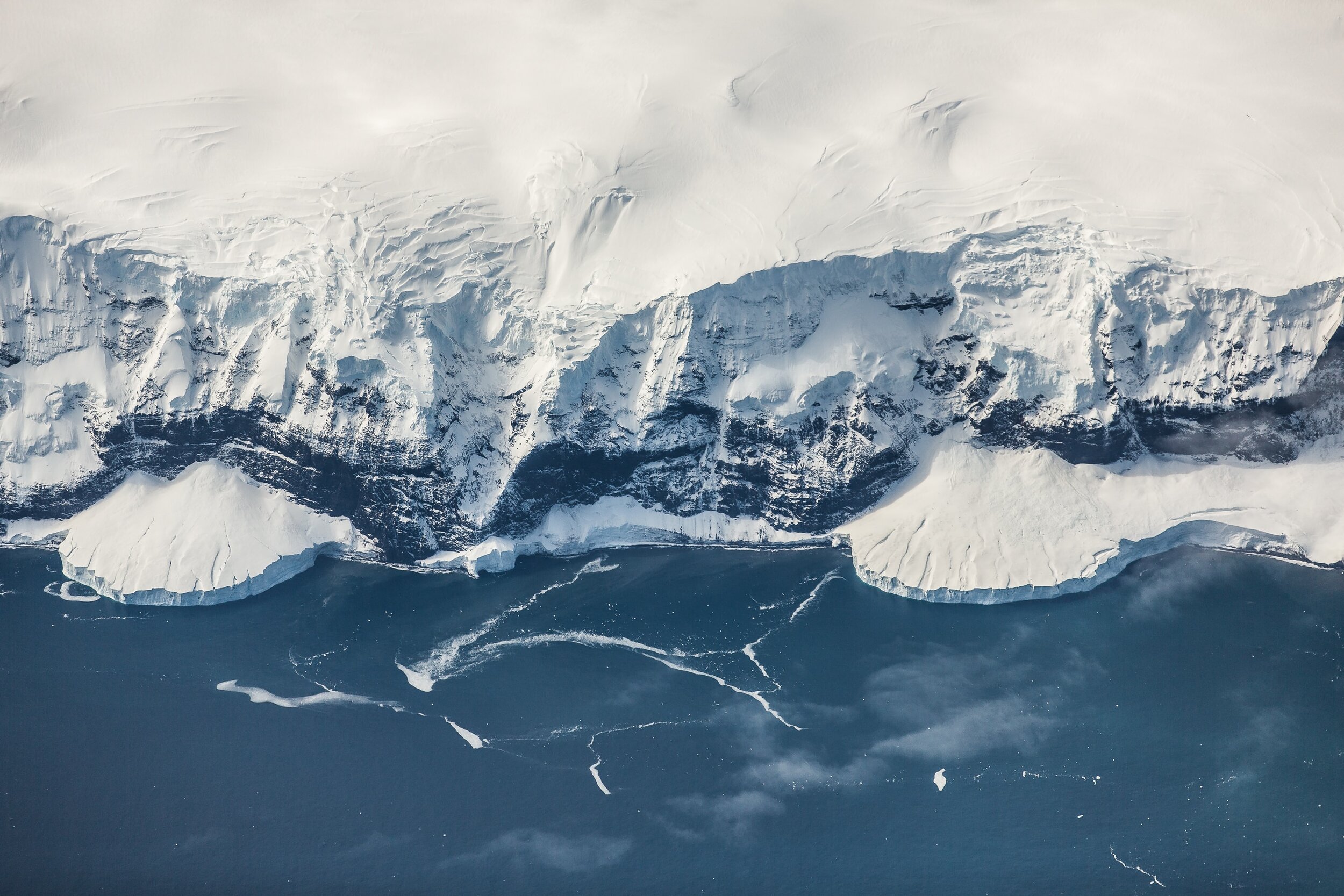9 Things You Should Know Before Traveling to Antarctica
Are you considering a journey to Antarctica? If you’re well-traveled, intrepid, and don’t mind a bit of cold, you’ve probably considered it at least once. Before you begin planning this once-in-a-lifetime experience, there are a few important things you need to know about traveling to the Seventh Continent.
To better understand what to expect from your expedition to Antarctica, keep reading!
1. It’s Not for Everyone
Some destinations really are suitable for everyone, no matter their travel style or unique preferences. I feel confident in saying Antarctica is not one of them.
Iceberg, Antarctica
Photo credit: James Eades
It’s definitely not a check-the-box experience or a bucket-list destination to fill your Instagram feed (though you’re sure to go home with some spectacular photos). So if traveling to Antarctica isn’t something that wholeheartedly speaks to you, then don’t just do it for the sake of saying, “I went to the seventh continent.”
Trust your gut. Go where you feel deeply compelled to go, and if you don’t feel that way about Antarctica, that’s okay!
If, on the other hand, you’re excited beyond words at the prospect of experiencing and exploring Antarctica, it might be the perfect destination for you.
Imagine being able to lose yourself in the breathtakingly pristine landscapes, take in the diverse array of wildlife, explore its vast terrain, and learn about the fragile ecosystem, all while being led by expert leaders and academics. If this makes your heart skip a beat, Antarctica is for you.
2. It’s Truly a Once-in-a-Lifetime Adventure
As you can imagine, a journey to Antarctica truly is the adventure of a lifetime. Although more are traveling to Antarctica, the Seventh Continent is still one of the least-visited places on Earth. Antarctica is a place of endless beauty, and its isolation from the rest of the world is one of the reasons it’s so appealing.
However well-traveled you are, Antarctica will take your breath away. It’s an experience you simply can’t have anywhere else on the planet.
If you long for exploring vast spaces, utter serenity, and connection with the natural world, Antarctica is an ideal place to be. And what better way to connect with friends and family than to embark upon a life-changing adventure together. Explore. Discover. Dive in. And don’t be surprised if you all bond like you never expected! Remarkable experiences like this have a knack for making that happen.
3. There’s More Than One Way to Get to Antarctica
Though Antarctica is startlingly remote, you have several options for getting here. The journey typically involves an expedition cruise or a flight followed by a cruise.
Note: It’s important to understand that in most cases, an expedition to Antarctica necessitates you to be on a boat to be able to truly explore the breathtaking beauty. Rest assured this is not the sort of "cruise" you’re probably thinking of. If you’re not the traditional cruise-loving type, prepare to be utterly delighted. An expedition cruise is an entirely different experience. The ship is your means of transport and a base for your exploration. And you’ll be glad to know you can have as many bells and whistles as you want. There’s a perfect ship for even the most cruise-averse traveler.
The vast majority of travelers arrive by cruise ship, setting sail from ports like Ushuaia, Argentina or Punta Arenas, Chile. You’ll cross the harrowing Drake’s Passage, so be prepared for choppy waters (though sometimes they can be relatively calm).
For an especially exclusive experience, consider starting your adventure exploring Patagonia and ending with a relaxing stay in Argentina (think luxe accommodations in Buenos Aires or wine exploration through Mendoza).
Or for a far-less traveled route and a destination that’s even more wild and uninhabited, consider a luxury voyage from Dunedin on New Zealand’s South Island. You’ll sail through the Ross Sea and the Sub-Antarctic Islands of New Zealand and Australia to the coast of East Antarctica. (This route features many UNESCO World Heritage Sites and is especially suited to travelers with a passion for science and the Antarctic history of exploration).
It’s important to note that while many mainstream travel providers may have Antarctica itineraries, not all of them actually offer landings there and may only sail off the shores of the continent. If you want to actually get your boots on the ground in Antarctica, it’s important to work with an experienced travel advisor who can help you navigate the many options.
4. You Can Have it Classic or Luxury
Depending on your tastes, interests, and individual traveling style, you can choose between a more classic type of experience or one that offers a bit more luxury. It’s important to consider the type of accommodations, comforts, dining experiences, and amenities that matter to you.
Would you like to travel on a smaller vessel or a larger one? Do you prefer to have a choice between two on-board restaurants or ten? Does it matter to you whether your ship is brand new or a few years old?
Different expedition companies also cater to different interests. Whether you want to polar kayak to see crabeater seals, hike a glacier, or simply enjoy the luxury experience of an open bar, butler service, and spacious suites, there’s a style of Antarctic travel that’s sure to suit your tastes.
5. This is Active Experiential Travel
Generally speaking, you can expect your time in Antarctica to be an active holiday. As with most travel, you can tailor your experience to be a bit slower paced. Or if you want a more adventurous pace, that can be arranged, too. Your preferences are vitally important in selecting the experience that is right for you.
Zodiac exploration, Antarctica
Depending on your preferences, you can explore Antarctica by zodiac, you can trek, and you can camp overnight. And if you want an especially intrepid experience, with the right budget, you can even take a journey that attempts to cross the Antarctic Circle—or you can charter a private yacht.
Ultimately, your decisions should be driven by what you want to do, how you want to explore, and what your focus is for your time in Antarctica. If you have a particular interest in photography, wildlife viewing, or birding, these are all helpful pieces of information to share when planning your expedition.
6. The Wildlife and Scenery are Magnificent
Prepare to be bowled over by just about everything you see in Antarctica. The wildlife and the landscapes are something to behold.
And you might be surprised to know that for all it’s steely blue glaciers and windswept expanses of mile-thick ice, Antarctica is surprisingly colorful, thanks to the algae blooms in the ice and bits of sediment brought ashore by throngs of Adélie penguins. The sheer number of them is astonishing.
Antarctica is also home to the world’s largest mammal, the blue whale; hundreds of thousands of the fastest underwater penguin, the gentoo penguin; and the long-distance champs of the air, albatrosses, which can cover a whopping 620 miles in a single day.
During your expedition, you might also encounter
Penguin, Elephant Island, Antarctica
Photo Credit: Rod Long
Penguins - Adélie, chinstrap, king, and emperor
Leopard seals
Elephant seals
Other birds
Snow petrels
Orcas
Fish
Squid
Krill
Land animals
Antarctica is technically a desert because it receives so little precipitation, but it’s far from static. It’s constantly in a state of transformation. In fact, during the winter in Antarctica, the surrounding sea freezes at a rate of 40,000 square meters (about 9.9 acres) per day. By winter’s end, the continent has doubled in size.
Some notable geographic features of this amazing continent include a vast network of islands, ice shelves, and glaciers. But Antarctica isn’t entirely covered in ice. The micro-climates of its “dry valleys” allow ice and snow to melt during the austral summer, revealing land free of glaciers.
Suffice to say that whatever you envision Antarctica to be, it’s probably all that and more.
7. The Ecosystem is Utterly Wild—and Fragile
Antarctica is home to an incredibly fragile ecosystem and environment. It’s important to understand and respect this fragility and travel responsibly.
Antarctica coastline
Photo Credit: Matt Palmer
In 1959, a cohort of 12 countries whose scientists had been working in and around Antarctica signed the Antarctic Treaty in an effort to sustain and preserve this place for future generations. There are now 54 parties to the treaty that regulate international relations and commit to protect the land they call “… a natural reserve, devoted to peace and science.”
Several outstanding expedition companies offer experiences that reduce your carbon footprint, including hybrid ships, on-board freshwater purification systems, and measures to decrease or eliminate use of plastics. Some have even gone as far as becoming carbon-neutral companies.
Rest assured we make every effort to help you travel in a way that is sustainable, mindful, and as environmentally friendly as possible.
8. Antarctica Requires Preparation - When, Where, & How
While it might be easy to dash off to Paris for the weekend, preparing for an expedition to Antarctica is much more involved. You need to know what to expect, and that’s where a travel advisor can be a major asset to your overall experience.
You’ll need to be prepared for the conditions, for one. Antarctic expeditions are not year-round; they’re seasonal and take place in the Austral Summer. The weather this time of year is still cold and dry, so you’ll need the proper gear.
9. Conditions Dictate Your Itinerary
Conditions dictate much more than your choice of clothing. They also determine your itinerary. Each day is driven by these conditions, and what you may or may not be able to do that day hinges on the weather at sea and on land.
As such, you’ll need to prepare well but hold your expectations loosely. But that’s part of the adventure—and the appeal—of traveling to one of the most remote places in the world.
Are You Ready for Antarctica?
To recap, here are nine things to know about the Seventh Continent:
Chinstrap Penguin, Antarctica - One of several species found on the continent
Photo Credit: Torsten Dederichs
It’s not for everyone
It’s truly a once-in-a-lifetime adventure
There’s more than one way to get there
You can go the classic or luxury route
This is active experiential travel
The wildlife and scenery are magnificent
The fragile ecosystem should be respected
You have to prep and set expectations
Conditions ultimately dictate your itinerary
Planning an expedition to Antarctica is a huge feat, and one you shouldn’t tackle alone. While plenty of travel is well-suited to the DIY approach, Antarctica is not.
Because travel to Antarctica is limited and requires some preparation, it is a destination for which you should plan well in advance. As such, if you think Antarctica may be toward the top of your list of places to explore in 2021 or 2022 (especially if you’ve been putting it off), it’s not too soon to start planning.
Start Dreaming Today
If future travels to Antarctica are speaking to you, reach out to schedule your complimentary consultation here. Whether you’re ready to start planning your own incredible adventure or you’d just like to know more about my process, now is the perfect time to get in touch. I’ll work with whatever timetable feels most comfortable to you.
It’s never too early to start envisioning your next adventure. Go ahead. Give yourself something amazing to look forward to.







